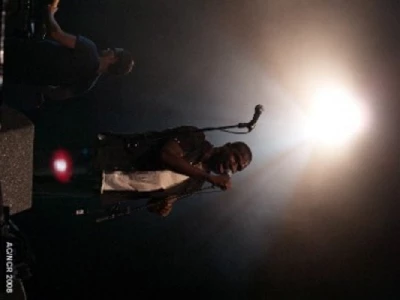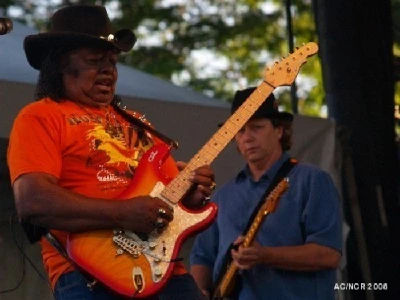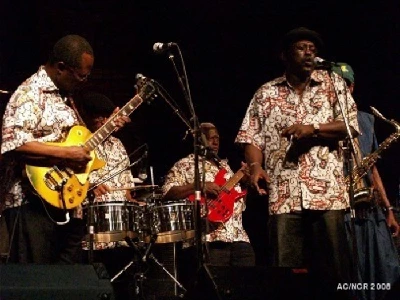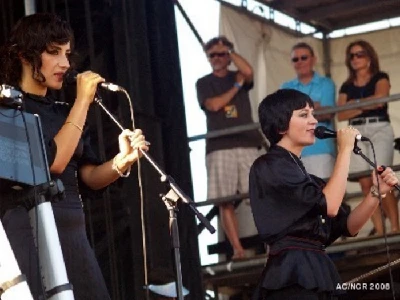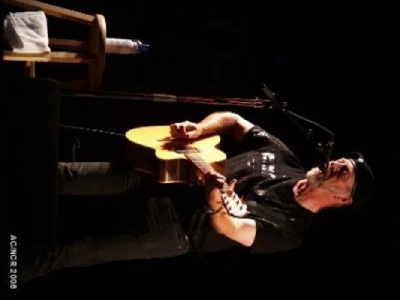Miscellaneous
-
LeBreton Flats, Ottawa, 3/7/2008...6/7/2008
published: 31 /
7 /
2008
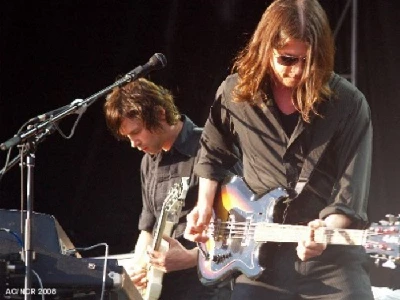
In the first four days of Ottawa's annual Cisco Sytems Bluesfest, Andrew Carver enjoys sets from among others the Secret Machines, TV On The Radio, Guitar Shorty, Orchestra Baobab, Ladytron and Richard Thompson
Article
For the second year in a row Ottawa’s Cisco Systems Bluesfest set up camp around the Canadian capital’s War Museum. The bunker-like structure provided plenty of space for two large stages on its front lawn, while three other stages looped around its west side and rear. Between its five stages (and one auditorium in the building itself) the festival treats 300,000 attendees to about 200 acts.
General consensus was that this year’s main stage lacked the star power of last year’s lineup, when Van Morrison, Bob Dylan, the White Stripes and Kanye West, among others, performed. Those with more eccentric musical tastes were bound to head for the side stages anyway.
The festival launched on a sunny Thursday at 6 p.m., with Canadian rockers Matt Mays and El Torpedo crashing a guitar chord over its bow on one of the site’s main stages (the one sponsored by a giant telecommunications company). Mays has been slated in some quarters for forgoing the melodic country of his first band, the Guthries, in favour of punchy, Neil Young and Bruce Springsteen-influenced rock’n’roll. It is their loss as Mays is a first-rate performer and his bouncy performance injected new life into classic rock.
The show then switched to the festival’s true main stage – the one sponsored by a giant financial institution – for a performance by New York space-rockers Secret Machines.
The band was decked out in black for the occasion (unwise, given the amount of sunlight the stage was receiving) and riffed away heroically in a vein previously tapped by Silver Apples and a legion of krautrockers. At this point the crowds at the festival were still sparse enough that a fester could make his or her way to the front of the stage without much difficulty. With people streaming in through the gate, it was plain that wasn’t a situation that was going to last, so I headed back to the giant telecommunications company stage for my first look at TV On The Radio.
The New York put on a stunning set, with frontman Tunde Adebimpe flailing his way around the stage shrouded in orange-hued haze as the band worked through there eccentric pop tunes with gusto.
The final act of the evening was Canada’s Tragically Hip. The band has cachets of popularity outside its homeland, but for the most part it is one of those combos that appeal primarily to its own countrymen.
The band grew out of Kingston’s bar band scene 25 years ago, and has been strengthening its prowess with relentless touring ever since. Lead singer Gord Downie is an entertaining performer. He plays around with his microphone like James Brown crossed with Charlie Chaplin, catches vast number of handkerchiefs to wipe the sweat from his hairless brow and shows absolutely no fear of looking foolish. Much laughter was heard when he busted a microphone stand into three parts and then handed it out to members of the audience with aplomb. Unfortunately his voice was not in great form, and a lot of his singing was more like shouting. That didn’t stop a huge crowd from going nuts for the native favourites.
On Friday the side stages were more tempting. The mains featured reggae-rapper Sean Kingston and indie starlet Feist, both guaranteed to attract massive crowds. There was more space to breath at the Roots Stage, one of two placed on opposite sides of a hill nestled against the War Museum’s north side. The first act on stage was Evil Farm Children. The Ottawa trio play an amped up surf rock that comfortably includes covers of Link Wray’s ‘Rumble’, George Jones’ ‘White Lightning’ and Black Sabbath’s ‘Children of the Grave’.
The next performer was Austin, Texas, bluesman Guitar Shorty. He is indeed short (and a bit round), and he is indeed guitar. Shorty is a hot enough player that his line-check garnered noisy applause. After that the audience suffered through a pair of predictable covers from his band. By the time Shorty was ready to perform another act was about to hit the stage on the other side of the hill on the Black Sheep Stage.
Dave Bidini once sang and played guitar in the Rheostatics, another peculiarly Canadian institution. An active performer who looked sharp in a cream-coloured porkpie hat and dun sports coat, Bidini’s adeptly rocking music was unfortunately undermined by his lyrics – is razzing the music of Nickelback a chore ?
The next show provided a hard choice – on one side of the hill, seminal African band Orchestra Baobab; on the other, seminal New Orleans songwriter and performer Allen Toussaint.
Orchestra Baobab won the coin flip and quickly had the audience out of their lawn chairs and swaying to a Cuban-Senegalese musical hybrid. The band is also blessed with a superlative guitarist in Barthelemy Attisso. The group kept up a tight rhythm even as some of its members switched between drums, saxophones and shakers, with the earthier vocals of the band’s older members being leavened by young recruit Assane Mboup’s cleaner croon.
Saturday promised a few highlights, not the least of which was Richard Thompson’s solo set, but the action began early with a robust set of country rock from locals The BushPilots on the River Stage, the third and largest side stage. Their rousing set concluded with an energetic run through The Flying Burrito Brothers ‘Sin City’.
There was more country rock on the giant telecommunications company stage with another local band, Silver Creek. The band is composed of some of the region’s most in-demand accompanists, and seems to be an opportunity for them to let their hair down with some Rolling Stones’-inspired music. A Joe-Cockerized version of the Beatles' ‘With A Little Help From My Friends’ was a set highlight.
With no act in the next few hours being a must-see, there was time to catch sets from sundry acts: Stiff-influenced British blues rocker Jon Amor was excellent; Canadian singer-songwriter Joshua Rutledge was melodic but bland; Pink Floyd fans the Frequency had matching red shirts, but were otherwise not hugely memorable; Amanda Rheaume played a capable set of Alanis Morrisette-influenced rock; Nick Moss and The Fliptops soldiered through the theft of all their gear with more British blues rock; lastly N.Q. Arbuckle played barroom country on the Black Sheep Stage.
By the time he had performed a handful of songs it was time to see Jenn Grant. The Halifax singer-songwriter has a lovely voice and has captivated many a listener with her debut, ‘Orchestra for the Moon’. Her voice and performance are as delectable in person, and she held the audience rapt.
Unfortunately, as her set wound down one of the festival’s woes reared its head. While some festivals are burdened with lousy sound, it must be said that Bluesfest does an excellent job of making things sound crisp. Alas, this sometimes means you can hear what’s going on from nearby stages.
From the giant communications company stage a rumble of bass came: Ladytron was cranking up their sinister cocaine psychosis synth rock. Up next to the stage’s sound system, the group’s low end could be felt delicately massaging one’s innards. The band has catchy tunes, a smashing pair of lady vocalists decked out in nacreous satin and silk and enough volume to kill small animals. It was the second truly striking performance of the festival after TV On The Radio, despite, as guitarist Daniel Hunt joshed “a really unusual show for us since it’s the first time we’ve seen sunlight.”
After grabbing a bite to eat, it was back at the festival for yet another highlight, and perhaps my favourite performance, by Richard Thompson. The noted member of Fairport Convention and solo artist collected a sizeable audience for his Roots Stage show, and he was more than happy to run through both his best known tunes and more recent fare. ‘Shoot Out The Lights’ and ‘I Want To See The Bright Lights Tonight’ were aired, as was stuff from his new album, ‘Sweet Warrior’, such as a politically charged ‘Dad's Going To Kill Me’. His amusing ‘The Hots For the Smarts’ was also a crowd pleaser.
Regrettably, the act on the River Stage was Zappa Plays Zappa, and the near constant guitar noodling of Frank’s offspring Dweezil regularly impinged on Thompson’s performance. The crowd of bugs attracted from the nearby Ottawa River by the stage lights proved a minor annoyance by comparison. Those trials aside, it was a majestic performance by a true original. Hopefully next year the festival will move solo acoustic performers to the Black Sheep Stage, where there is less sound bleed.
Sunday was marijuana day at Bluesfest – not its official designation, but with jam band Widespread Panic, reggae heroes the Wailers and West Coast rapper Snoop Dogg hogging the spotlight the air did take on a distinct odour at some stages. Earlier in the day the sky was a bit clearer and late wakes could get their morning jolt from pop rockers Hollerado and Quebec garage titans Les Breastfeeders.
Hollerado are a highly caffeinated quartet from Toronto which sounds like a rowdier, goofier Sloan or Fountains of Wayne -what more need be said about a song titled ‘Do The Doot Do Toot Do’? There was plenty of running about and jumping on stage, and lead singer Menno finished things by running off into the audience, cordless microphone in hand. Their set might have been in the running for hardest rocking of the festival if it were note for Les Breastfeeders’ main stage set a few minutes later.
Even down a man, tore through its set like men (and woman) possessed, with a few francopop tunes thrown in to allow the audience to catch their breath.
Chuck Prophet turned things down a notch on The Black Sheep Stage, but without losing a whit of musical intensity. The former Green On Red star is both an excellent guitarist and a first rate songwriter with a drawl that makes him sound a bit like an alternative Tom Petty.
He was also quite loud, and more nuanced sounds beckoned from the other side of the knoll. Ottawa’s the Acorn have earned countrywide plaudits for their first long-player ‘Glory Hope Mountain’, and live the band made effective good use of a pair of drummers and a diverse array of instruments to colour frontman and lyricist Rolf Klausener’s tails of a young immigrant’s travels from Third World hardship to other perils in frosty Canada.
The final show on Sunday was by former Ornette Coleman guitarist James Blood Ulmer, who has continued to use Coleman's theory of harmolodics in his music-making. Looking very much the jazzman with his coloured round spectacles, close-cropped beard and round African cap, Ulmer ostensibly plays the blues, but the blizzard of notes he extracts from his instrument go far beyond the flat fifth that typify the form. It was an engaging, and sometimes intellectually stimulating performance.
Picture Gallery:-
